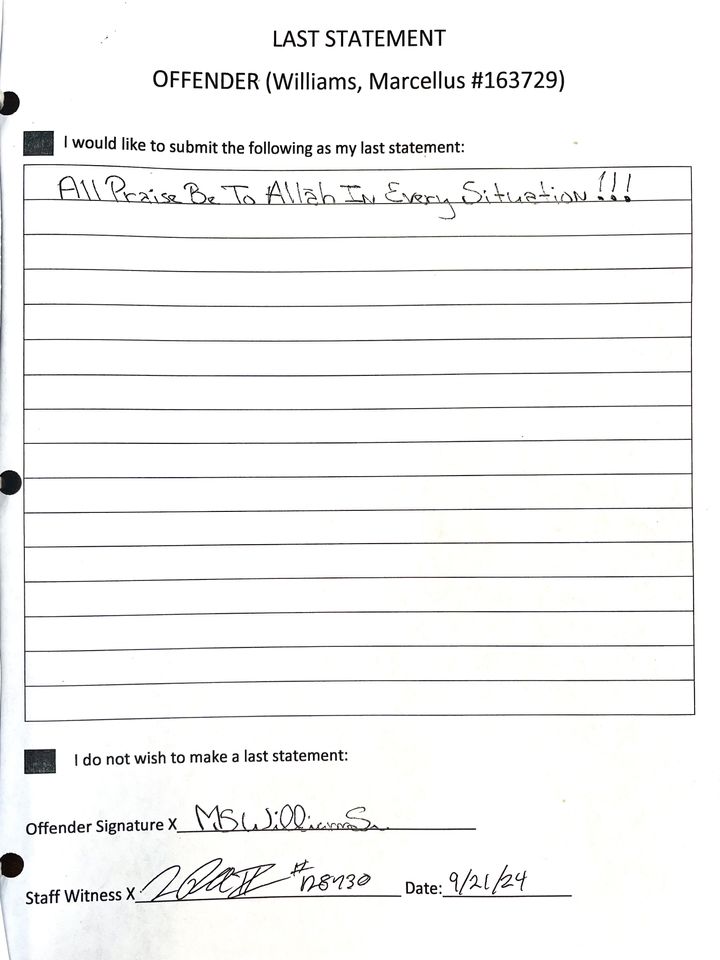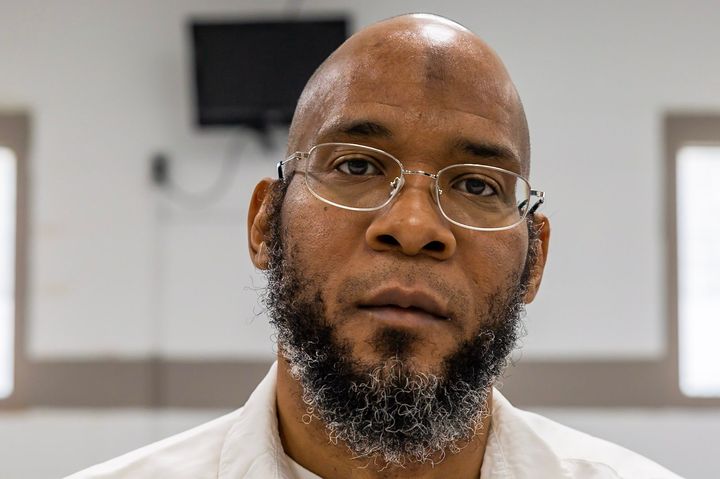Man Executed In Spite Of Prosecutor’s Objections Left Behind Touching Message Of Faith
After years of fighting to prove his innocence, 55-year-old Marcellus “Khaliifah” Williams was executed in Missouri on Tuesday, leaving behind a touching and simple message as his last statement.
Prosecutors, Williams’ defense attorneys and the victim’s family agreed that his murder trial had been mishandled and that his life should have been spared. A groundswell of online supporters had called out the lack of evidence against him, and Williams had maintained that he was not involved in the 1998 murder for which he’d been convicted.
Advertisement
In spite of that, Missouri Gov. Mike Parson (R) denied his request for clemency.
“All praise be to Allah in every situation!!!,” Williams wrote in a final statement that was filed with the state corrections department.

Missouri Department of Corrections
Tricia Rojo Bushnell, Williams’ attorney, described her client in a statement before his death as a “kind and thoughtful man, who spent his last years supporting those around him in his role as Imam.”
“We will remember him for his deeply evocative poetry and his love for and service to his family and his community,” Bushnell said. “While he yearned to return home, he is a thoughtful man who has worked hard to move beyond the anger, frustration, and fear of wrongful execution, channeling his energy into his faith and finding meaning and connection through Islam.”
Advertisement
The Innocence Project shared some of Williams’ poetry online. He told the organization that his most meaningful pieces were the ones he wrote to support and remember his fellow incarcerated people.

Photo courtesy of Marcellus Williams Legal Team
A predominately white jury found Williams guilty in 2001 for the 1998 murder of Felicia Gayle, a reporter for the St. Louis Post-Dispatch who was found dead inside her home with 43 stab wounds. Williams was sentenced to death that same year.
But his defense attorneys with the Midwest Innocence Project argued in a motion to vacate his conviction that his trial was unfair, using witnesses who were not credible and forensic evidence that had no match with Williams. The St. Louis County Prosecutor’s Office, which tried the case in 2001, also said the conviction should be overturned. Prosecutors reached an agreement with Williams’ defense team to take him off death row in exchange for life in prison, but the state’s attorney general blocked the agreement.
According to a joint brief filed over the weekend by prosecutors and the defense, there was no forensic evidence that linked Williams to Gayle’s murder. The bloody shoe prints found in Gayle’s home did not match Williams’ shoe size, the hairs that were found near her body did not belong to him, and the fingerprints found on the kitchen knife used in the crime did not match his.
Advertisement
Current prosecutors even acknowledged the original trial prosecutors’ “mishandling, contamination, and destruction of evidence” and the racial bias that Williams had faced in court.
“Marcellus Williams should be alive today.”
– Wesley Bell, prosecuting attorney for St. Louis County
However, Circuit Judge Bruce F. Hilton said earlier this month in his judgment that there was “no basis for a court to find that Williams is innocent” and denied the motion to vacate his conviction.
After denying Williams’ request for clemency, Parsons criticized media coverage of the case.
“The facts are Mr. Williams has been found guilty, not by the Governor’s Office, but by a jury of his peers, and upheld by the Courts,” he said.
According to Bushnell, those who opposed Williams’ execution included Gayle’s family, the jurors who sentenced him and more than 1 million concerned citizens and faith leaders.
Advertisement
“The execution of an innocent person is the most extreme manifestation of Missouri’s obsession with ‘finality’ over truth, justice, and humanity, at any cost,” Bushnell said.
Wesley Bell, prosecuting attorney for St. Louis County, said in a statement to HuffPost that Williams should be alive today.
“There were multiple points in the timeline when decisions could have been made that would have spared him the death penalty,” Bell said. “If there is even the shadow of a doubt of innocence, the death penalty should never be an option. This outcome did not serve the interests of justice.”
A team from the federal public defender’s office that worked on his case also released a statement on Tuesday, saying they had never “met someone like him, and never will we again.”
“His faith was so much a part of his identity and there was always an acknowledgment of regret he expressed in not finding it earlier,” the statement continued. “While he would readily admit to the wrongs he had done throughout his life, he never wavered in asserting his innocence of the crime for which he was put to death tonight.”
Advertisement

Comments are closed.